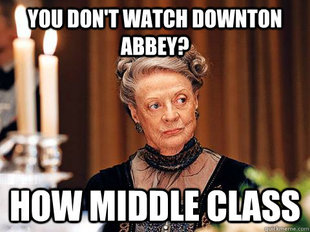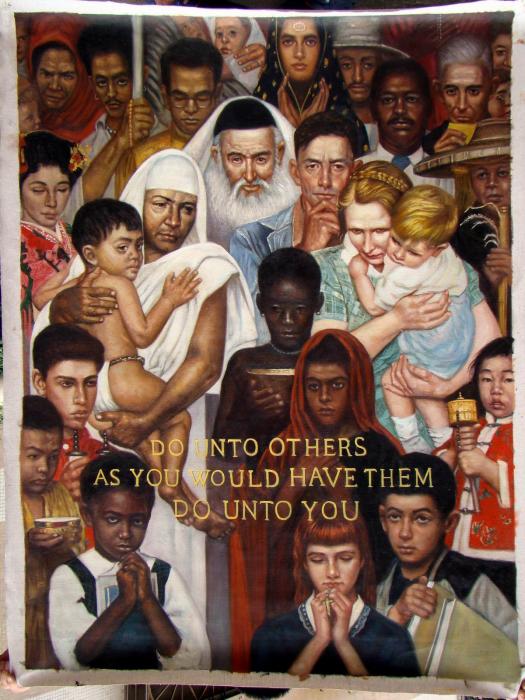Newtown Congregational Church, Newtown, CT
June 23, 2013
(My colleague and friend, Matt Crebbin, has been going full tilt and then some since Dec. 14, 2012. Not only has he been caring for the members of his congregation, and with his wife, parenting their four active children, he's also been a strong, steady presence in the gun control movement, both here in CT and in Washington. I'll be preaching at his church through July 14 to help give him some much needed rest.)
Lately, it seems, whenever a television
show has an unhappy ending to its season finale, it’s a newsworthy
occasion. Earlier this year when Matthew
died in a car crash on Downton Abbey,
one could hear the collective “NO!” accompanied by tears, echoed on Facebook
and other social media websites. And
just two weeks ago, HBO’s Game of Thrones
shocked and disappointed most, if not all, of their fandom with more than its
share of violent and unexpected deaths.

Do
you know the word ‘fandom’? If you live
with teenage or any age fans of The Doctor or Avatar the Last Airbender or Star
Wars, you know what I’m talking about. Fandom
is a combination of the word “fanatic” and “kingdom”. Those who inhabit a fandom are passionate, from
the smallest details to the overarching narrative and themes of the object of
their focus. They engage in ‘cosplay’,
dressing up as favorite characters, paying attention, again, to every detail so
as to look as authentic as possible.
They attend huge fandom gatherings, such as Comic Con or a Star Trek convention,
form discussion groups on social media, throw thematic parties, and collect all
the toys. They are invested.
| Where great stories are massacred |
They
are especially invested in the story arc and the characters. Whenever any of us reads a novel or watches a
movie or TV show, we are invested in the outcome. How
many of you have ever felt betrayed by an author or screenwriter? What was your expectation that was dashed?
It
seems we are geared for the happy ending, or if circumstances are bad, to
expect the worst. But life is lived in
shades of charcoal, slate, and battleship.
In books, TV and movies we often seek to escape the way life is for a
more hopeful or sometimes an even darker fiction. We can put up with villains for a while, even
suffer through a few heroes’ deaths, but only because we expect the villains to
get their due and the heroes their redemptive victory in the end. We expect a certain amount of justice and
redemption, of fair play. But a great
many events in the past decade up to the past six months have given us cause to
question that narrative.
Though
it has been with us since the beginning, but especially since September 11, we
know that evil, pain, and suffering can come down on anyone, anytime,
anywhere. Some of it is within our
control but a lot of it isn’t. Sometimes
the hero wins, sometimes not. Justice is
our aim but oftentimes we miss the mark.
We’ve known for quite a while that fairytales are just that. But now as a human race it seems we have
begun to collectively wonder about the hero’s tale and does it still ring true
for us? There are times we are tempted,
like one fan of Game of Thrones who
tweeted, “I don't know if I'll ever recover from
this. No, I'm out. I quit. I'm done.”
Our
hero, the prophet Elijah, has reached this point in his relationship with the
God fandom. He’s followed God’s
storyline faithfully, he’s preached against the foreign god Baal, even ordered
the death of the priests of Baal, and it’s got him in deep trouble with Queen
Jezebel. Prophets walk a fine line
between hero and scapegoat, good-guy and outlaw. In
order to establish her cult to the god Baal, Jezebel had given orders that all
the prophets of Israel be killed; Elijah thinks he is the sole survivor of that
holocaust. Now Jezebel wants Elijah
dead.
So
Elijah assumes that he’ll never recover from this, that he’s out, he’s
quitting, he’s done. He goes out into
the desert, lies down under a tree, and asks God to take his life. And like a good Jewish mother, perhaps God is
thinking “When was the last time he ate?
Maybe he’s just hungry”, and sends an angel with some fresh bread, baked
on hot desert rocks and a jar of water to nourish Elijah not just once but
twice. The journey will be long and God
wants Elijah to live.
 |
| Ferdinand Bol, Elijah Fed by an Angel, (c. 1660-1663) |
When
Elijah reaches Mt. Horeb, he’s still sticking to the hero’s script: “God, I’ve been passionate about you and your
word. Everyone else has either abandoned
you or has been killed. I’m the only one
who’s left, and now I’m about to be killed off as well.” God then tells Elijah that he is about to
pass by. Suddenly there is a violent
wind, then an earthquake, and last a fire.
Yes, earth, wind and fire.
Knowing the Jewish narrative well, Elijah expects God to show up in one
of these. But no; rather, God arrives in
a mighty silence.
We in
the United Church of Christ proclaim that God is still speaking but there are
times when it seems that God is strangely quiet. Many a faith community has been closely
following the script, passionate about the details, and yet even so, our
numbers have been steadily declining for a decade, if not two or more. The tale of our hero, Jesus, has not rung
true for some folks. Resurrection is not
easy to come by. Good people have stood
faithful during the hard times and good, and have left church for various
reasons, many of them hurtful. “I don't know if I'll ever
recover from this. No, I'm out. I quit.
I'm done.”
But none
of this is really new. Dietrich
Bonhoeffer, a young German pastor arrested for conspiring to assassinate
Hitler, wrote these words from prison in 1944:
“God as a working hypothesis in morals, politics, or science, has been
surmounted and abolished; the same thing has happened in philosophy and
religion. …Anxious souls will ask what
room there is left for God now.”
He
continues, “So our coming of age leads us to a true recognition of our
situation before God. God would have us
know that we must live as [those] who manage our lives without him. The God who is with us is the God who
forsakes us. The God who lets us live in
the world without the working hypothesis of God is the God before whom we stand
continually. Before God and with God we
live without God. God lets himself be
pushed out of the world onto the cross.
He is weak and powerless in the world, and that is precisely the way,
the only way, in which [God] is with us and helps us.” [i]
God
doesn’t take control of the story, despite all that we have done to mess with
God’s narrative of mercy and justice.
Rather, God works within the thwarted plot lines. God uses us to accomplish a sacred purpose,
even though our character is riddled with flaws. When the inexplicable, the unthinkable happens,
God comforts us in the faces of unexpected helpers. And, with the patience of Job, God guides us
through what we often cannot understand, even violence and meaningless
death. And time and again, it’s not our
death or another’s that we’re afraid will be meaningless but our lives or the
life of one cut short.
We live
in an unpredictable world, sometimes random and cruel, yet also fiercely
beautiful and fragile. We’re beginning
to realize that maybe there isn’t a script to follow so much as we’re co-authoring
a story, our story, each day. And it’s
full of contradictions, not just Jew or Greek, male or female, slave or free,
but gay and straight and bisexual, transgendered and queer. It’s extreme wealth, different kinds of
middle class, working poor, and abject poverty; it’s seeker, believer, agnostic
and atheist; not just Republican or Democrat but Independent, Libertarian, Tea
Party, Green Party, and many others. We
are many colors, many voices, all inhabiting this one earth.
 |
| Norman Rockwell, The Golden Rule, 1961 |
God IS
still speaking but through us and within our stories. How invested are we in the outcome, not just
of our own stories but of the story of our neighbor and the stranger and the
enemy? The ending will take care of
itself if we are mindful of our character, our actions, decisions, and
attitudes. But it is up to us to choose
each day whether we are going to hang in there, not with the fandom but the
kingdom—God’s story of righteousness, mercy and justice.
There
are times, I am sure, when we all have been in doubt that we would recover from
a blow to our faith, when we thought we were through with church and were ready
to quit. What brought us back from that
cliffhanger? What is the story of this
church and how has it changed your life?
What choices do you need to make in order that the outcome is one of
mercy and justice? Just how invested are
you as one Body?
The
story is ongoing, and we have come this far by faith. May God grant us the courage to live out what
we pray and profess, that in the end, love will win.
Amen.

No comments:
Post a Comment